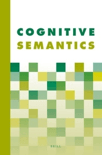
Cognitive Semantics
metrics 2024
Fostering Insights into Language's Cognitive Roots
Introduction
Cognitive Semantics, published by BRILL, is a leading academic journal dedicated to the intricate study of cognitive processes underlying language use and semantic meaning. With its ISSN 2352-6408 and E-ISSN 2352-6416, this journal contributes significantly to the fields of linguistics and language studies, reflecting its importance in contemporary research on cognitive linguistics. Over its publication span from 2015 to 2024, it has established a niche as a Q3 ranked journal in the Linguistics and Language category for 2023, showcasing its relevance and growing influence in the academic community. Although currently not open access, the journal aims to provide a robust platform for exchanging ideas, theories, and methodologies related to cognitive semantics, fostering interdisciplinary dialogue among researchers, professionals, and students. Readers can expect to uncover valuable insights into the cognitive mechanisms that shape our understanding of language, making this journal an essential resource for anyone involved in linguistic research.
Metrics 2024
 0.15
0.15 0.50
0.50 -
- 8
8Metrics History
Rank 2024
Scopus
IF (Web Of Science)
JCI (Web Of Science)
Quartile History
Similar Journals
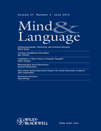
MIND & LANGUAGE
Innovating Understanding in Linguistics and PhilosophyMIND & LANGUAGE, published by WILEY, is a premier academic journal that has established itself as a leading platform for interdisciplinary research at the intersection of linguistics, philosophy, and cognitive science. With a noteworthy impact factor and a remarkable ranking in the top quartiles (Q1) for both Linguistics and Language as well as Philosophy, it reflects the journal’s robust contribution to the academic community, garnering attention from researchers and scholars worldwide. Since its inception in 1986, MIND & LANGUAGE has provided an avenue for exploring the complexities of language perception, cognitive processes, and the philosophical implications of linguistic studies. Its comprehensive scope ensures that it remains a critical resource for professionals and students alike who are engaged in the exploration of language's role in human thought and society. The journal's rigorous peer-review process guarantees the high quality and scholarly integrity of the published work, making it an essential addition to any academic library.

REVUE DE LINGUISTIQUE ROMANE
Advancing Knowledge in Linguistic HeritageREVUE DE LINGUISTIQUE ROMANE, published by the esteemed SOCIÉTÉ LINGUISTIQUE ROMANE, is a prominent academic journal dedicated to the exploration of Romance linguistics. With its ISSN 0035-1458, the journal plays a significant role in advancing knowledge within the fields of linguistics and the history and philosophy of science. Although it does not currently offer Open Access, it provides critical insights and peer-reviewed research that are indispensable for scholars, educators, and students interested in the nuances of Romance languages. The journal, which has seen converged coverage from 2006 to 2017, and then again from 2019 to 2021, is ranked in the third quartile (Q3) across various categories within Scopus, reflecting its established presence in the academic community. As a vital resource for interdisciplinary studies, REVUE DE LINGUISTIQUE ROMANE is instrumental for those seeking to deepen their understanding of linguistic structures, cultural nuances, and the historical development of Romance languages.
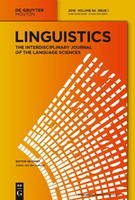
LINGUISTICS
Empowering Scholars Through Open Access KnowledgeLINGUISTICS, published by De Gruyter Mouton, stands as a leading journal in the field of linguistics, exemplifying innovation and scholarly rigor. With its roots tracing back to 1963 and a commitment to advancing linguistic research, this journal has consistently achieved Q1 status in both the Linguistics and Language category, marking it among the top-tier journals in the discipline. The journal is indexed with impressive rankings in Scopus, evidenced by its position within the 84th percentile in Language and Linguistics, and 83rd percentile in Social Sciences, demonstrating its significant influence and reach among scholars. Transitioning to Open Access since 2022, LINGUISTICS enhances accessibility and fosters a wider dissemination of knowledge. Published in Germany and backed by a reputable publisher, LINGUISTICS is dedicated to exploring diverse topics in linguistics, making it essential reading for researchers, professionals, and students aiming to stay at the forefront of linguistic scholarship.
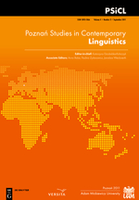
Poznan Studies in Contemporary Linguistics
Fostering scholarly discourse in language research.Poznan Studies in Contemporary Linguistics, published by DE GRUYTER MOUTON, is a pivotal journal in the field of linguistics, with an ISSN of 0137-2459 and an E-ISSN of 1897-7499. Located in Germany, this esteemed journal has consistently contributed to the academic landscape since its inception. As of 2023, it holds a Q2 category rank in Linguistics and Language and boasts commendable Scopus rankings, featuring in the 69th percentile for Arts and Humanities and the 66th percentile for Social Sciences. The journal emerges as a vital platform for scholars to explore contemporary linguistic theories and practices, making it an essential resource for researchers, professionals, and students alike. With a converged publication period from 2007 to 2024, it aims to facilitate a deeper understanding of linguistic advancements and trends. While the journal currently does not offer open access, its rigorous peer-review process ensures the highest quality of published research, strengthening its role as a leading discourse in the dynamic field of linguistics.
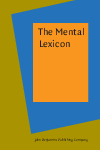
Mental Lexicon
Bridging Cognitive Neuroscience and Linguistic TheoryMental Lexicon is a leading academic journal published by JOHN BENJAMINS PUBLISHING CO that spans significant interdisciplinary terrains including Cognitive Neuroscience and Linguistics. Since its inception in 2006, the journal has gained a prestigious reputation, currently holding a Q1 tier in Linguistics and Language and a Q3 rating in Cognitive Neuroscience based on 2023 categorizations. With impressive Scopus rankings—247 out of 1088 in Language and Linguistics and 94 out of 115 in Cognitive Neuroscience—it serves as a critical platform for the dissemination of innovative research and theoretical advancements in mental lexicon studies. The journal fosters an environment for scholars, researchers, and students to explore the complexities of language processing and cognitive functions, thereby contributing to the realization of our understanding of the mind and language. While Mental Lexicon operates under closed access, it remains an essential resource for those seeking to delve into the intricate relationship between linguistic capabilities and cognitive processes.

Jezikoslovlje
Exploring the Frontiers of LinguisticsJezikoslovlje, published by the Josip Juraj Strossmayer University, Faculty of Philosophy in Croatia, is an essential publication in the field of Linguistics and Language Studies. Launched in 2008 and extending its contributions to the academic community through 2024, this journal addresses a spectrum of linguistic research, facilitating scholarly dialogue around both theoretical and applied aspects of language. With a current Scopus ranking placing it in the 54th percentile in the Arts and Humanities and the 50th percentile in Social Sciences, Jezikoslovlje serves as a vital resource for researchers and students looking to engage with contemporary linguistic issues. Although it operates under a traditional access model, its indexed presence and rigorous peer-review process ensure that published works maintain a high scholarly standard, inviting contributions that advance understanding in this dynamic discipline. The journal's commitment to fostering knowledge in linguistics makes it a significant platform for academics in Croatia and beyond.

Natural Language Semantics
Exploring the Depths of Linguistic and Philosophical InsightNatural Language Semantics, published by Springer, is a premier journal that has established itself as an essential platform in the fields of linguistics and philosophy. Since its inception in 1992, the journal has dedicated itself to advancing the understanding of natural language meaning through rigorous research and innovative methodologies. With its impressive Q1 ranking in both Linguistics and Language and Philosophy as of 2023, and a notable Scopus ranking in the 85th percentile within the Arts and Humanities, this journal is at the forefront of scholarly discourse. Authors and researchers contribute high-impact, peer-reviewed articles that explore topics ranging from semantics, pragmatics, to the intersections of philosophy of language. Though not an open-access publication, it provides maximum accessibility through various distribution channels, ensuring widespread dissemination of knowledge. Researchers, professionals, and students will find Natural Language Semantics a critical resource that not only informs but also inspires future inquiry in the analysis of meaning.

Lingue e Linguaggio
Exploring the Dynamics of Language and ThoughtLingue e Linguaggio, published by SOC ED IL MULINO, is a distinguished academic journal in the field of Linguistics and Language, hailing from Bologna, Italy. With an esteemed Q2 ranking in its category as of 2023, this journal is recognized for its contributions to both the arts and humanities as well as social sciences, achieving notable positions within Scopus rankings. It serves as a vital platform for researchers, practitioners, and students interested in exploring various linguistic phenomena, language dynamics, and theoretical frameworks. Although it operates under a traditional subscription model rather than open access, its comprehensive array of studies and publications provides significant insights and fosters academic discourse. With a publication period extending from 2002 to 2024, Lingue e Linguaggio continues to be a key resource for advancing the understanding of language in contemporary contexts.

CogniTextes
Advancing Linguistic Understanding, One Article at a Time.CogniTextes (ISSN: 1958-5322) is an esteemed open access journal published by the Association Française de Linguistique Cognitive, dedicated to the exploration of cognitive linguistics and its intersection with textual interpretation. Since its inception in 2007, CogniTextes has been a vital platform for disseminating cutting-edge research that delves into the cognitive processes underlying language use, enhancing our understanding of linguistics in a cognitive context. This journal not only fosters scholarly communication among researchers and professionals but also serves as a valuable resource for students keen on advancing their knowledge in cognitive linguistics. With its headquarters located at the University of Lille 3 in France, CogniTextes encourages contributions from a diverse spectrum of disciplines, thereby enriching the field of linguistics and cognitive studies. The journal's commitment to open access ensures that its findings are readily available to a global audience, thus facilitating knowledge sharing and academic discourse.

JOURNAL OF MEMORY AND LANGUAGE
Transforming Understanding of Language through MemoryJOURNAL OF MEMORY AND LANGUAGE, published by Academic Press Inc Elsevier Science, is a prestigious journal dedicated to advancing the understanding of cognitive processes related to language and memory. With an impact factor that underscores its authority and relevance, the journal has achieved remarkable recognition, ranking in the Q1 quartile across multiple disciplines such as Artificial Intelligence, Experimental and Cognitive Psychology, Linguistics and Language, and Neuropsychology and Physiological Psychology, as of 2023. With its origins tracing back to 1985, the journal continually provides a platform for high-quality research and innovative studies that intersect diverse fields including cognitive science and linguistics. Although it does not offer open access, the Journal of Memory and Language serves as an essential resource for researchers and professionals seeking to explore the intricate interplay between memory and language. Make sure to access state-of-the-art research that not only informs theoretical frameworks but also has practical implications in real-world situations.